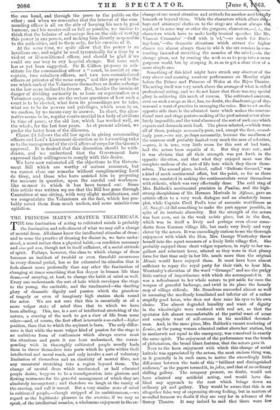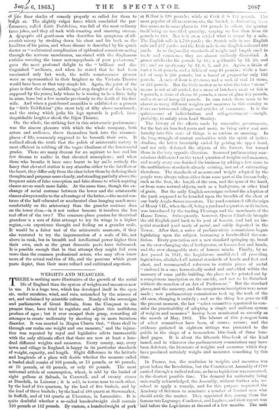THE PRINCESS MARY'S AMATEUR THEATRICALS.
THE true fascination of acting to cultivated minds is probably the fascination and refreshment of what we may call a change of mental dress. All classes know the intellectual stimulus of dress ; and to some the practice of dressing for dinner is, we have under- stood, a moral rather than a physical habit,—a condition necessary and sine gild non, though hot in itself sufficient, of a social attitude of spirit. Perhaps, however, this class to which change of dress becomes an incident of twofold or even threefold occurrence in every diurnal period, has so far exhausted its stimulus that it feels almost more profoundly than any other the fascination of changing at times something that lies deeper in human life than dress,—of essaying, at least, to change the habit of mind as well. Every one understands the sort of halo which envelopes the stage to the young, the excitable, and the uneducated—the dazzling glory of dramatic dignity and passion which the grandeur of tragedy or even of imaginary high station sheds round the actor. We are not sure that this is essentially at all a more vulgar state of mind than that to which we have been alluding. This, too, is a sort of intellectual stretching of the nature, a craning of the neck to get a view of life from some other—and, of course, the first effort is towards a so-called —higher position, than that to which the aspirant is born. The only differ- ence is that while the more vulgar kind of passion for the stage is an ambitious form of restlessness which always craves most the situations and parts it can least understand, the corres- ponding wish in thoroughly cultivated people usually leads them to throw themselves into parts which lie quite within theii. intellectual and moral reach, and only involve a sort of voluntary limitation of themselves and an elasticity of mental fibre, not any unnatural stretching into a region beyond them. The change of mental dress which uneducated or half educated people desire, happens to be a transfiguration into glorious and flowing vestments for the graceful management of which they are absolutely incompetent ; and therefore we laugh at the vanity of the craving, and call it unreal. But a very similar state of mind in cultivated people,—though stripped of its ambitiousness,—we regard as the legitimate pleasure in the exercise, if we may so speak, of the intellectual muscles, a wholesome enjoyment in the ex-
change of one moral situation and attitude for another accideIkihly beneath or beyond them. While the characters which allure sh - boys and attorneys' clerks on to the stage are almost always tine royal, or in some way or other the gorgeous, characters,—i. e., the characters which have to make lordly ironical speeches like Mr. Vincent Crummles' " Orff with is 'eci,"—so much for Buck- ing-ham,"—the dramatic situations which attract the higher classes are almost always those in whi .11 the art consists in con- tracting instead of stretching the muscles of the mind ;—in the. change given, not by craning the neck so as to peep into a more gorgeous world, but by stooping it, so as to gat a clear view of a more simple one.
Something of this kind might have struck any observer of the very clever and amusing amateur performance on Monday night before the Prince and Princess of Wales at the Bijou Theatre. The acting itself was' very much above the average of what is called professional acting, and we do not know that there was any special glory in achieving this much of success. The cultivated amateur,, even on such a stage as that, has, no doubt, the disadvantage of shy- ness and a want of practice in managing the voice. But to set on the opposite side there is the educated taste which makes the conven- tional rant and stage posture-making of the professional actor abso- lutely impossible, and the total absence of the sort of audience which expects and demands such food. The pieces selected,—which were all of them, perhaps necessarily poor, and, except the first, exceed- ingly poor,—we say, perhaps necessarily, because the smallness of the amateur staff probably limited very much the area of selection, —gave, it is true, very little room for this sort of bad taste, had the actors been capable of it. But they were not ; and it was obvious that all their strength was put forth in the opposite direction, and that what they enjoyed most was the- complete undress of the sort of life into which they threw them- selves. The second piece, indeed, called "Delicate Ground," was- a kind of mock sentimental affair, but the point, so far as there was one, consisted in making the sentimentalists cover themselves with ridicule, which was very effectually done. The cold ring of Mrs. Baldock's sentimental precision in Pauline, and the high- strung sheepishness of Mr. Herman Merivale in Alfonse, gave an artistic effect to a very weak dialogue and an absolutely inane. plot, while Captain Cecil Peel's tone of sarcastic worldliness as M. Sanyfroid did something to make the part appear possible, in spite of its intrinsic absurdity. But the strength of the actors. was best seen, not in the weak satiric piece, but in the first, which was in itself a lively and perhaps even clever come- clietta from German village life, but made very lively and very clever by the actors. It was exceedingly curious to see the thorough enjoyment with which the Hon. Mrs. George Wrottesley threw herself into the squat manners of a lively little village flirt. She probably enjoyed those short vulgar repartees, in reply to her un- gallant and reluctant lover, uttered as they were in that plump form for that time only in her life, much more than the original Minnie would have enjoyed them. It must have been almost sufficient to repay the royal party for their visit, to hear Mrs. Wrottesley's elocution of the word " Grumps!" and see the pudgy little curtsey of impertinence with which she accompanied it. It was a refreshment -to her whole nature to put aside for once the. weapon of graceful badinage, and twirl in its place the homely mop of village ridicule. Mr. Brandram succeeded almost as well' in assuming the needlessly humiliated and inferior air of a rather stupidly good lover, who does not dare raise his eyes to his own choice. The almost degraded humility and want of dignity- in the wheelwright were rendered with real art, so that the spectator felt almost uncomfortable at the partial want of sense and complete want of self-esteem in his muddled devoted- ness. And, in the same piece, Mrs. Baldock's vacant rendering of Louise, as the young woman educated rather above her station, but in motherwit not equal to the emergency, was conceived in exactly the same spirit. The enjoyment of the performance was the touch of plebeianism, the broad blunt features, that the actors gave it.
Next to the keen enjoyment with which this change of social latitude was appreciated by the actors, the most cutious thing was, as it generally is in such cases, to notice the exceedingly little difference between the taste of this "brilliant and distinguished audience," as the papers termed it, in jokes, and that of an ordinary shilling gallery. The company present, no doubt, would not have admired any artificial acting, and would have dis- liked any approach to the rant which brings down an ordinary pit and gallery. They would be aware that this is an altogether false way of expressing strong feeling, but in matters of so-called humour we doubt if they are very far in advance of the Surrey Theatre. It may indeed be said that there were few
of e finer shades of comedy properly so called for them to la' gh at. The slightly vulgar farce which concluded the per- Armance, called Little Toddlekins, was full of the most ordinary farce jokes, and they all took with amazing and unerring success. A elyspeptic old gentleman who describes his symptoms of all- overish misery by stroking down his chest and his back as the localities of his pains, and whose disease is described by his quack doctor as "a chronical complication of epidemical sensations acting through the nervous membranes, associated with the diaphanous cuticles covering the inner metempsychosis of your periosteum," gave the most profound delight to the " brilliant and dis- tinguished "audience, and when he stated that he had been vaccinated only last week, the noble countenances present were as openmoutheci in their laughter as the Victoria Theatre would have been at that very simple hit. Again, the point of the piece is that the clumsy, middle-aged step daughter of the hero, is supposed by the young lady whom he is wooing to be a little baby in arms, born but a few months previously to the death of his first wife. And when a pasteboard mannikin is exhibited as a present for "little 'foddlekins" (the stout lady of fifty above mentioned), and the string which jerks his legs upwards is pulled, inex- tinguishable laughter shook the Bijou Theatre.
On the whole, the striking fact in this aristocratic performance was the sincere pleasure with which the whole company, both actors and audience, threw themselves back into the common- places of life, commonly supposed to be beneath their own. It realized afresh the truth that the polish of aristocratic society is most efficient in rubbing off the vague idealisms of the lower social grades. There are many dreams for an aspirant to lose and but few dreams to realise, in that elevated atmosphere ; and when those who breathe it have once learnt to lay aside entirely the fancy that elevated station is any stimulus either to the intellect or the heart, they differ only from the class below them by defining their thoughts and purposes more clearly, and standing partially above the frequent mists of false conception and false shame to which aspiring classes are so much more liable. At the same time, though the ex- change of social costume between the lower and the aristocratic classes always results to the advantage of the latter,—the moral cos- tume of the half-educated or uneducated class hanging much more comfortably on the aristocracy than the grander costume does on the lower class,—is it not rather because it involves the less real effort of the two ? The common-place passion for theatrical grandeur is a sort of faint attempt to try its wings in a higher region,—to experience thought and feeling on a grander scale. It would be a fairer test of the aristocratic amateurs, if they also ventured to try the impersonation of a scale of life, not above in rank, but in breadth and intellectual power higher than their own, such as the great dramatic poets have delineated. It is possible enough that in that attempt they might fail even more than the common professional actors, who may often know more of the actual realities of life, and the passions which great poets depict, than their more refined and cultivated superiors.































 Previous page
Previous page